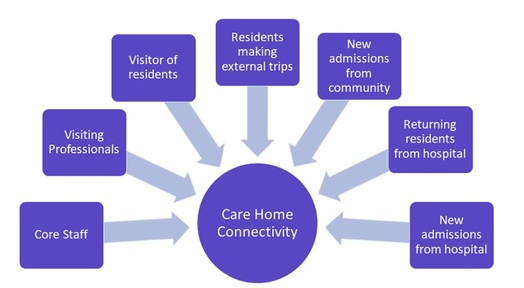Discharging untested hospital patients was not main driver of care home outbreaks say scientists
The discharge of hospital patients into care homes who had not been tested for Covid-19, was not the ‘dominant driver’ for virus outbreaks in care settings during the first wave of the pandemic, scientists report.

The Scientific Advisory Group for Emergencies (Sage) Social Care Working Group (SCWG) has published a statement which reveals ‘at least some care home outbreaks were caused or partly caused or intensified’ by hospital discharges but ‘hospital discharge does not appear to have been the dominant way in which COVID-19 entered care homes'.
It found hospital discharge of people to care homes without testing early in the pandemic ‘is highly likely to have caused some outbreaks or been one of the often multiple introductions of infection to care homes which experienced an outbreak. However, it is highly unlikely to have been the dominant driver of all care home outbreaks in wave 1.’
Over 40,000 care home residents in the UK died from Covid during the pandemic.
Greater size of care home ‘strongly associated with increased risk’
The consensus statement, (published 26 May) said evidence from different studies of Covid outbreaks in care homes from the UK and abroad, indicated the size of the care home to be most strongly associated with the increased risk of an outbreak, with larger homes significantly more likely to have an outbreak because of a greater 'footfall' in larger care homes with more staff moving between them, as well as GPs and district nurses.
Hospital patients were rapidly discharged into care homes without Covid testing during the early stages of the pandemic, despite the risk of asymptomatic transmission, with government documents showing there was no requirement for this until mid-April.
In the first wave of the pandemic – (the first 23 weeks of pandemic, from 4 March 2020 to 7 August 2020), it has been estimated that there were about 29,542 excess deaths in all care homes in England, according to figures from Office for National Statistics.

The consensus statement referred to one study ‘Genomic epidemiology of COVID-19 in care homes in the east of England’ involving 1,167 residents from 337 care homes were identified from a dataset of 6,600 Covid cases from the East of England.
The scientists revealed ‘Viral genomic analysis can help identify whether care home outbreaks are due to a single introduction of infection or whether outbreaks are driven by multiple separate introductions of infection.
‘A large scale study in the East of England found that only 5.8 per cent of care home cases were definitely hospital acquired. When the genomes of care home residents were compared to a control group of community cases the diversity of the genomic lineages was similar suggesting hospital discharges were not the primary driver.
'There was epidemiological evidence linking some outbreaks in different care homes to professional visitors’ such as nurses and GPs.
Care England chief: 'Buck stops' with Matt Hancock
Meanwhile the High Court has ruled government policies on discharging untested hospital patients into care homes at the start of the coronavirus pandemic was 'unlawful'.
Martin Green, the chief executive of Care England, which represents care homes, has said "the buck stops" with former Secretary of State for Health and Social Care Matt Hancock over Covid care home deaths.
Professor Martin Green recently told LBC: "it is not acceptable to say no one really gave the advice", and the situation didn't require "anything other than common sense".
A spokesman for Mr Hancock said Public Health England (PHE) had failed to tell ministers what they knew about asymptomatic transmission. He has said that he wished it had been brought to his attention sooner.
The Public Accounts Committee (PAC) in summer 2020 first recommended a review be undertaken into which care homes took discharged patients and how many went on to have outbreaks.
The Department of Health and Social Care (DHSC) commissioned the consensus statement on the impact of hospital discharge from the SCWG in November 2020.
SCWG participants who contributed to the consensus statement, include Adam Gordon, an expert witness for the claimants in the case for Dr Cathy Gardner and Fay Harris against the Secretary of State for Health and Social Care, NHS Commissioning Board (NHS England) and PHE.
Dr Gardner and Fay Harris’ fathers died during the first wave of the pandemic.
The SCWG scientists’ consensus also stated: ‘All the analyses done are based on data that are less than ideal’.
Sage has recommended better social care data, after highlighting a lack of good quality routine data when compared to the NHS, which has limited their analysis.
Latest News
 29-Jul-24
Dementia Bus gives carehome.co.uk staff insight into life with dementia
29-Jul-24
Dementia Bus gives carehome.co.uk staff insight into life with dementia
 01-Mar-24
Find out the top care homes in 2024
01-Mar-24
Find out the top care homes in 2024
 21-Mar-23
UK's top care homes in 2023 revealed
21-Mar-23
UK's top care homes in 2023 revealed
 03-Jan-23
carehome.co.uk launches free care helpline
03-Jan-23
carehome.co.uk launches free care helpline
 13-Dec-22
5 mins with Emily Whitehurst, chief operating officer for Constantia Healthcare
13-Dec-22
5 mins with Emily Whitehurst, chief operating officer for Constantia Healthcare